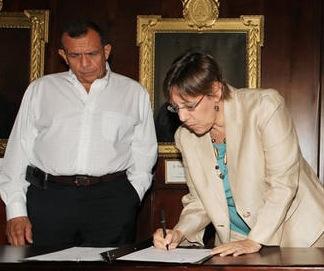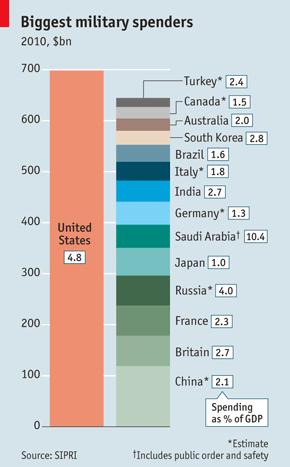A June 20 blog post by Harvey Morris, featured on the website of The New York Times, pointedly asks in its headline, “Asylum for Assange: What’s in It for Ecuador?” Morris is of course referring to the case of Julian Assange, the head of WikiLeaks, as he requests political asylum at the Ecuadorean embassy in London.
Assange recently lost a court battle in Britain to avoid extradition to Sweden, where he faces questioning about allegations of sexual misconduct. He has expressed fear that once in Sweden, he would then be sent to the United States, where he could face prosecution under the archaic Espionage Act of 1917 (Sweden has already rendered suspects on behalf of the CIA to be tortured in Egypt).
But Morris focuses on another issue: “what’s the benefit for Ecuador” in providing Assange with asylum? Morris approaches Ecuador’s upcoming decision by commenting on what he considers to be its self-interested motivations. Perhaps asylum would be a way for Ecuador's President Rafael Correa to reciprocate for Wikileaks’ revelations, which may have been “a useful tool for the Ecuadorian leader,” he writes. Correa expelled the U.S. ambassador last year, says Morris, “over comments in a leaked diplomatic cable in which she alleged high-level police corruption and suggested that Mr. Correa might have known about it.”
Morris also argues that the assertion of Ecuador’s foreign minister Ricardo Patiño Aroca—“Mr. Assange wants to continue his mission in a peaceful country, dedicated to truth and justice”—is an assessment “at odds with the judgment of his government’s domestic critics.”
Whereas the Times understandably attempts to unpack and scrutinize the intentions, statements, and actions of foreign countries like Ecuador, a brief examination of the newspaper's coverage illustrates the fact that such scrutiny is selective. When it comes to the United States and its allies, the Times hardly ever interrogates motives. The Times often blindly accepts U.S. policies and justifications at face value, no matter how absurd they may be.
Take, for example, the following upbeat headline, which ignores a decade-long U.S. military occupation (unsurprisingly characterized by torture, the bombing of children, and mass murders). The Times unquestioningly treats the generosity of the United States as a given:
The Times similarly presents U.S. policy toward Latin America at face value in the headline below. The paper unironically refers to how the “lessons” of the brutal U.S. invasion and occupation of Iraq “help” the United States combat drugs in Honduras:
So keeping to Honduras, what’s in it for the United States? Apart from presenting official rationales, The Times doesn’t really answer the question. If the same scrutiny toward Ecuador’s policies were applied to the United States and its motives, obvious questions related to Honduras would arise, including: How can the United States successfully wage a war against drugs in that country when State Department cables reported on  cocaine shipments to the properties of Miguel Facussé, a Honduran plutocrat who receives indirect support from the United States? Does the rationale of a drug war divert attention from Honduras’s historical and current role as a regional hub for the U.S. military in Central America? If drug trafficking has exploded in Honduras since the 2009 coup d'etat, why did U.S. Ambassador to Honduras Lisa Kubiske authorize $50 million in aid on June 12 to the illegitimate regime of Honduran president Porfirio Lobo? And why is so much of that money going to bolster the Honduran security forces, which are accused of killing hundreds of civilians over the past three years?
cocaine shipments to the properties of Miguel Facussé, a Honduran plutocrat who receives indirect support from the United States? Does the rationale of a drug war divert attention from Honduras’s historical and current role as a regional hub for the U.S. military in Central America? If drug trafficking has exploded in Honduras since the 2009 coup d'etat, why did U.S. Ambassador to Honduras Lisa Kubiske authorize $50 million in aid on June 12 to the illegitimate regime of Honduran president Porfirio Lobo? And why is so much of that money going to bolster the Honduran security forces, which are accused of killing hundreds of civilians over the past three years?
According to the Times, however, the U.S. presence in Honduras—which includes three forward operating bases built just this year alone—is part of an effort to “help small Central American governments.” Even the civilians injured by U.S.-led military operations in that country understand this, the Times purports. Damien Cave, reporting in late May from Ahuas, a town in the Mosquitia region of Honduras, found that the residents were “angry” at the forces who carried out a U.S.-led raid that killed two pregnant women and a 14-year-old boy. But later in his piece he writes that they were “furious” with the traffickers, while “disappointed” in their neighbors, and only “frustrated” with “Honduran and American authorities.” After being shot at by a gunner in a U.S. helicopter, having their family members killed, and being terrorized by commandos in their own homes, the townsfolk would have been content to simply restore their reputations, according to Cave:
At the site of the raid, in fact, there is still a desire for American help. Town officials and victims like Hilda Lezama, 52, who has bullet wounds in her legs from the raid, say they mainly want an apology and an acknowledgment that they were not traffickers, as some American and Honduran officials have suggested.
*
The contrast in the Times’ coverage of Honduras with that of Ecuador is exceedingly obvious. Morris writes in his blog post that Correa has made moves to “curb freedom of the press and gag broadcasters.” On the same day, June 20, Ravi Somaiya reported  in the pages of the Times that “Mr. Correa has presided over a crackdown on journalists in Ecuador, according to several reports.”
in the pages of the Times that “Mr. Correa has presided over a crackdown on journalists in Ecuador, according to several reports.”
The Times has displayed such concern toward Ecuador’s threats against newspapers that in 2012 alone, the paper has dedicated three news articles and two editorials to the subject. Regarding the safety of journalists in Honduras, where more than 20 of them have been killed since 2009, The New York Times has dedicated precisely zero news articles to the matter in 2012; the Times’ editorial board has also remained silent on the topic during the same period. (It’s worth mentioning that no reporters in Ecuador have been killed during Correa’s tenure.)
In criticizing Correa, Morris also takes a healthy skepticism of the leader's claims to a laughable extreme. He writes, “The Ecuadorian president and his would-be guest [Assange] certainly share a visceral mistrust of the ‘imperialist’ tendency of Unites States foreign policy.” But Morris’s use of scare-quotes for U.S. imperialism disregards the unambiguous realities of U.S. military expenditures [see graphic], let alone the very origins of U.S. foreign policy. As Harvard history professor Charles S. Maier writes in Foreign Affairs, a journal of the Council on Foreign Relations:
David Ramsay, South Carolina's delegate to the Continental Congress, wrote as early as 1778 that the grandeur of the American continent provided the basis for a realm that would make "the Macedonian, the Roman, and the British sink into insignificance." George Washington thought of the new country as a "rising" or an "infant" empire. Thomas Jefferson, who secured the vast Mississippi and Missouri valley corridors, famously envisaged an "empire of liberty."
Could one even imagine the Times’ use of scare-quotes for mundane yet highly controversial Beltway parlance? Would U.S. leaders ever receive such treatment from the newspaper when employing phrases like “defense,” “War on Drugs,” “militant,” “national security,” “terrorism,” or even “free trade agreement"?
Keane Bhatt is an activist in Washington, D.C. He has worked in the United States and Latin America on a variety of campaigns related to community development and social justice. His analyses and opinions have appeared in a range of outlets, including NPR, The Nation, The St. Petersburg Times, CNN En Español, Truthout, and Upside Down World. He is the author of the new NACLA blog “Manufacturing Contempt,” which takes a critical look at the U.S. press and its portrayal of the hemisphere.



